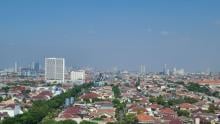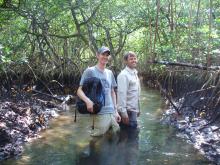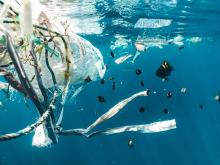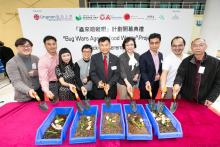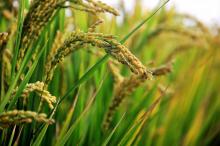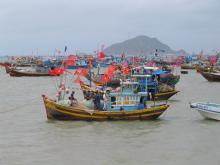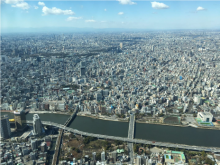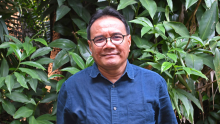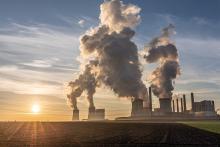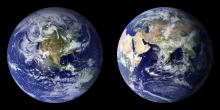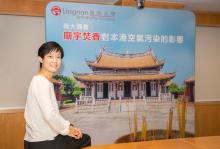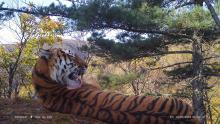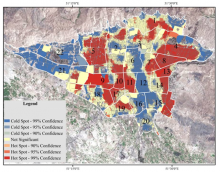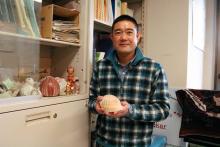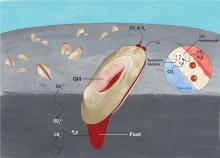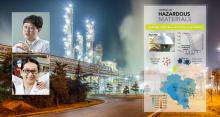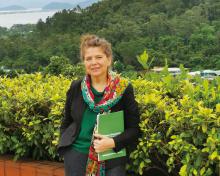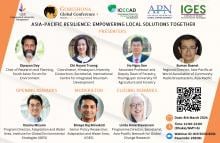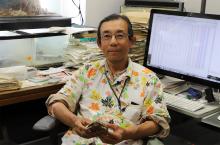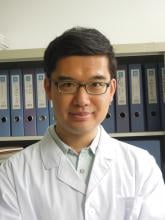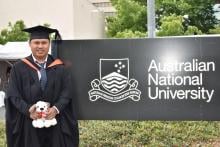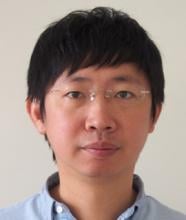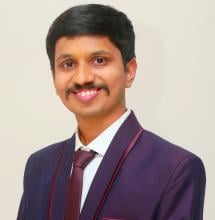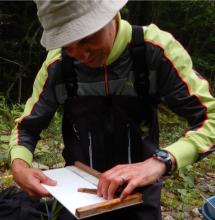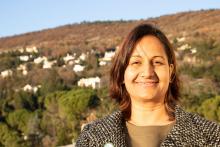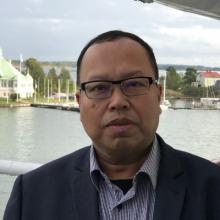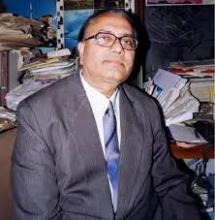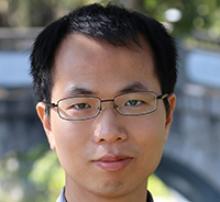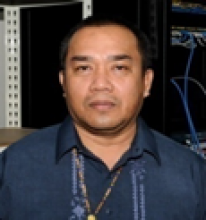Earth Sciences Environmental science
News
30 Nov 2023
Aids local governments in adapting to the threats of climate change
05 Oct 2023
Hunting for supermassive black holes, Coastal survival at risk, Calcium and dead cell clean-up, Two naps are better than one & Pineapple leaf prosthetics. Read all in the latest Editor's Choice.
01 Sep 2023
Research published today in Nature warns that rising seas will devastate coastal habitats, using evidence from the last Ice Age.
27 Jul 2023
What does healthy aging look like? For answers, Hiroshima University environmental health expert Dr. Saori Kashima taps into a new science dedicated to Earth’s longevity.
25 Jul 2023
Illuminating the molecular ballet in living cells, Charting the voyage of marine plastics, A glimpse into the origins of life & Earliest human journeys to Asia. Plus Submissions open for Asia Research News 2024. Read all in the latest Editor's Choice.
22 Jun 2023
Researchers from Newcastle University, led by Dr Kheng Lim Goh, have developed a cost-effective Cellular Automata (CA) model for predicting marine plastic movement. Findings from model predictions align well with traditional particle-tracking models, suggesting its potential as a valuable tool for assessing marine plastic pollution and mitigation strategies.
28 Mar 2023
Lingnan University (LU) kickstarted their Bug Wars against Food Waste Project on 27 March in order to both reduce food waste and turn it into a useful asset. The campaign aims to inspire students, faculty members and the whole community to adopt a low-carbon lifestyle, using black soldier flies to convert food waste collected from student hostels and canteens into organic fertiliser for the Lingnan Gardeners Project and plants on the campus, as well as quality feed for campus animals. Staff, students and the elderly are signing up as low-carbon ambassadors to develop and apply innovative ideas to resolve community issues and promote a more sustainable lifestyle.
03 Mar 2023
Naturally formed iron oxides on the surface of plastic tubes offer an inexpensive and sustainable method to reduce arsenic contamination in crops.
20 Jan 2023
Overeating mechanism: why "eating just one chip"🍟 is impossible, Measuring hidden energy of gamma-ray bursts, Marine species that can adapt to ocean acidification & A rough start can lead to a strong bond, Read all in our first Editor's Choice of 2023. Plus our interview on what dengue vaccine approval in EU💉means for global dengue protection.
08 Dec 2022
Reef corals provide an accurate, high-resolution record of the influence of the El Niño Southern Oscillation on rainfall, flooding and droughts in the Mekong River Delta, Vietnam.
12 Oct 2022
—For acceleration of social implementation of wastewater-based epidemiology—
15 Sep 2022
Researchers develop a new integrated framework that factors in the many variables relevant to accurate carbon emissions modeling in the transportation sector, allowing for policymakers to choose the best path to achieve carbon neutrality.
25 Jul 2022
Three of the nuclear power plants that supplied Tokyo, Japan with its electricity have been shut down since 2003. To understand the long-term implications of this change to Tokyo’s power grid, researchers studied how CO2 emissions in the city differed since the power plant closures.
20 Jun 2022
Daniel Murdiyarso of CIFOR-ICRAF becomes the first-ever Indonesian scientist to receive the prestigious Honorary Doctorate from the University of Helsinki
12 May 2022
Humanity is “at a crossroads” when it comes to managing drought and accelerating mitigation must be done “urgently, using every tool we can,” says a new report from the United Nations Convention to Combat Desertification (UNCCD).
04 Nov 2021
The diversity of threatened fish in estuaries increases when surrounded by forest cover, whereas estuaries surrounded by farmland show the opposite effect.
19 Oct 2021
An ambitious project using cutting edge environmental DNA, known as eDNA, to understand the richness of biodiversity of UNESCO’s marine World Heritage sites launches today.
14 Oct 2021
Climate change may lead to a modest net reduction in global annual energy expenditures by the end of the 21st century, according to a study published in Nature.
13 Oct 2021
The El Niño Southern Oscillation (ENSO) could impact child nutrition in many countries in the tropics, a new study in Nature Communications suggests.
10 Sep 2021
A recent study conducted by the Science Unit of Lingnan University in Hong Kong (LU) shows that concentrations of fine particulate matter (PM2.5) from incense burning both inside and outside temples could be 6 times and 4 times of the recommended levels respectively. In addition, the more temples there are in the same district, the higher the respiratory mortality rate. The research team suggests that alternative measures, such as installation of automatic mist sprayers to reduce smoke dispersion, as well as using incense made with non-toxic substances to minimise health risks to worshippers and neighbours, should be considered.
27 Jul 2021
An international team of scientists say that tigers could come roaring back in an unlikely place: northeastern China.
16 Apr 2021
A person who owns a car or who has a college education may be less vulnerable to COVID-19, according to an analysis of cases in Tehran, Iran, one of the early epicenters of the pandemic. While such variables do not inherently lower a person’s risk, they do indicate an infrastructure of protection that persists despite how densely populated a person’s district might be.
05 Apr 2021
“The earth is suffering from several ‘diseases’: global warming, ocean acidification, habitat loss, etc. If any of these diseases remains uncured, other diseases will accelerate and cause new ones to appear, hence putting humanity’s well-being in danger,” said Associate Professor Masahiko Fujii. For this reason, the research staff of the Faculty of Environmental Earth Science keeps on assessing the current global environmental issues and promoting renewable energy sources as a possible solution.
29 Mar 2021
A study led by scientists at Hong Kong Baptist University (HKBU) has decoded the genomes of the deep-sea clam (Archivesica marissinica) and the chemoautotrophic bacteria (Candidatus Vesicomyosocius marissinica) that live in its gill epithelium cells. Through analysis of their genomic structures and profiling of their gene expression patterns, the research team revealed that symbiosis between the two partners enables the clams to thrive in extreme deep-sea environments.
26 Feb 2021
Twenty-two scholars of The Education University of Hong Kong (EdUHK) were named on Stanford University’s list of the top two per cent most-cited scientists in various disciplines, including President Professor Stephen Cheung Yan-leung, Chair Professor of Public Policy; Professor Jim Chi-yung, Research Chair Professor of Geography & Environmental Science; and Professor Wong Ming-hung, Advisor (Environmental Science).

24 Feb 2021
Springer Nature and the University of Tokyo to hold SDGs Symposium 2021, “Interdisciplinary science solutions for food, water, climate and ecosystems Sustainable Development Goals”
03 Nov 2020
A recent study, affiliated with South Korea's Ulsan National Institute of Science and Technology (UNIST) has developed a new nanocatalyst that recycles major greenhouse gases, such as carbon dioxide (CO2) and methane (CH4), into highly value-added hydrogen (H2) gas.
03 Nov 2020
A recent study, affiliated with South Korea's Ulsan National Institute of Science and Technology (UNIST) has proposed a new approach for the highly spatially resolved human health risk assessment of both gaseous and particulate polycyclic aromatic hydrocarbons (PAHs).
12 Oct 2020
Governments around the world are taking steps to slow the pace of global warming. In the report titled "Hong Kong’s Climate Action Plan 2030+", a 70 per cent reduction in carbon intensity by the year 2030 was set. Achieving this ambitious target will require a major change in behaviour at both the corporate and individual levels.
Events
08 Mar 2024
The Asia-Pacific Network for Global Change Research (APN), in collaboration with the Institute for Global Environmental Strategies (IGES), will host the Asia-Pacific Resilience: Empowering Local Solutions Together session at the Fourth Annual #Gobeshona Global Conference (#GGC4) on 8 March 2024 at 11:00-13:00 (Dhaka/GMT+6) or 14:00-16:00 (Japan/GMT+9).
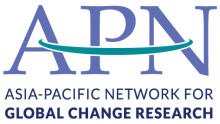
10 Mar 2024
This Forum will take place on 10 March 2024 in Kobe, Japan. It will be held in a hybrid format (on-site and virtual).

09 Nov 2023 to 10 Nov 2023
Seeking to build experience in collaborative regional research and scientific capacity development in the Asia-Pacific region? Interested in writing grant proposals for global environmental change projects? Come and join our open capacity building seminars to receive grant proposal writing guidance and an introduction to the Asia-Pacific Network for Global Change Research (APN)'s 2023 Call for Proposals. Two seminars are available on the 9th and 10th of November, and we warmly welcome participation from early career professionals and global change practitioners in the Asia-Pacific region.

24 Aug 2023
Using Data for Sustainability: An evening of Short Talks and Networking
25 Oct 2021 to 27 Oct 2021
10 Mar 2021
Upcoming side event at the 7th Asia-Pacific Climate Change Adaptation Forum: Partnerships to harmonize science information and knowledge at regional scales for enabling adaptation

26 Mar 2021
Springer Nature and the University of Tokyo to hold SDGs Symposium 2021, “Interdisciplinary science solutions for food, water, climate and ecosystems Sustainable Development Goals”
Researchers
Dr. Eisuke Hasegawa is an Associate Professor at the Graduate School of Agriculture, Hokkaido University, where he heads the Animal Ecology Laboratory. His research interests include animal ecology; evolutionary biology; natural selection; sociality; and ethology.
Dr. Zheng Chen is an environmental chemist and associate professor at Xi'an Jiaotong-Liverpool University. His research interests include nutrient recycling from agricultural waste, soil contamination and remediation.
A researcher/program director at ALARM - for land & environmental justice and climate & environmental integration in development planning of Myanmar & a graduate of YAU (Myanmar), AIT (Thailand) & ANU (Australia).
Dr. Brian Man Yu Bon is currently serving as an Assistant Professor in Department of Science and Environmental Studies, The Education University of Hong Kong.
An energetic and talented researcher with a strong desire to build a career within the research industry. Passionate, self-motivated individual with a drive to succeed, with excellent organizational skills. Highly efficient and methodical with a good eye for detail with a proactive approach to performance and data accuracy.
Dr. Irina's research focuses on sustainability, including an analysis of environmental management, the urban environment, climate change adaptation and mitigation, and education for sustainable development, or ESD, and its application in real-world contexts.
Assistant Professor of Environmental Science
Krishna Institute of Allied Sciences
Krishna Institute of Medical Sciences
Deemed To Be University, Karad
Tomohiro Mochizuki is a specially-appointed assistant professor at Earth-Life Science Institute (ELSI) - Tokyo Institute of Technology.
Jorge García Molinos is an aquatic ecologist broadly interested in global change ecology and macroecology.
Dr. Hemu Kharel Kafle is the Founder and Director of Research at Kathmandu Institute of Applied Sciences (KIAS), Nepal, and a scientist at the Centre for Water and Atmospheric Research (CENWAR) within it.
I completed B.Sc. (Honours) and M.Sc. in Marine Sciences from University of Chittagong, Bangladesh, M.Phil in Fishereis Technology from University of Calcutta, India and Ph.D. in Environmental Sciences from the Jahangirnagar University, Bangladesh.
I am working as a Program Manager of a Non-Government Organization YPSA (Young Power in Social Action), Bangladesh on Climate Change Adaptation related issues. I have 12 years of Professional experiences of working in a NGO for work on climate change issue, environmental management and human rights issues.
I have a keen interest in climate change, fisheries management, coastal pollutions and environmental assessment. I am author of 70 national and international publication based on climate change, aquatic biodiversity and environmental management issues that are available in Google Scholar and ResearchGate.
Research interest
climate change, fisheries management, aquatic biodiversity, environmental pollution monitoring
Dr. Mashura Shammi is an associate professor at the Department of Environmental Sciences, Jahangirnagar University, Bangladesh.
Dr NK Prasanna is currently working as Sr. Scientist & Editor, Indian Journal of Biochemistry & Biophysics, Research Journals Division at CSIR-National Institute of Science Communication and Policy Research, New Delhi. Before joining CSIR (NIScPR), she was at IIT Guwahati. Dr Prasanna completed her Ph.D from Institute of Medical Sciences, Banaras Hindu University, Varanasi.
In CSIR-NIScPR, She served one important flagship journals viz. Indian journal of Biochemistry and Biophysics (IJBB; ISSN: 0301-1208) It is pertinent to mention that the journal ranks first among all the NIScPR journals as per the available Journal Metrics by international agencies such as Thomson Reuters and Scopus. Details of remarkable academic achievements of IJBB which she spearheading, both nationally and globally. The Indian journal of Biochemistry and Biophysics (IJBB) is a premier SCI-indexed bimonthly peer-reviewed research journal that publishes original research articles in the subject area of biochemistry and biophysics
Co-Founding Member and Managing Director of the Association of Advancing Life And Regenerating Motherland (ALARM), a think tank in Myanmar.
Secretary General and Treasurer of the International Geographical Union (IGU) and Professor of Geography at University of Delhi.
Associate Professor at Hong Kong Baptist University researching hydroclimatology, climate extremes and water hazards.
Puvadol Doydee is an Assistant Professor in the Faculty of Natural Resources and Agro-Industry at Kasetsart University Chalermphrakiat Sakon Nakhon Province Campus, Sakon Nakhon Province, Thailand.
Professor in Agriculture and Education in the Iloilo Science and Technology University Leon Campus (ISAT U). Leon, ILOILO, PHILIPPINES
Giants in history
Archana Sharma (16 February 1932 - 14 January 2008) conducted research into plant and human genetics that expanded the understanding of both botany and human health. In relation to botany, she uncovered the means by which asexually-reproducing plants evolve into new species.
Võ Quý (1929 – 2017) was a Vietnamese ornithologist who studied the destruction of tropical forests and agricultural lands in Vietnam by Agent Orange, a herbicide used by the U.S. military during the Vietnam War. In addition to planning forest restoration projects, Quý rediscovered the rare eastern sarus crane, an endangered species that had vanished during the war.



